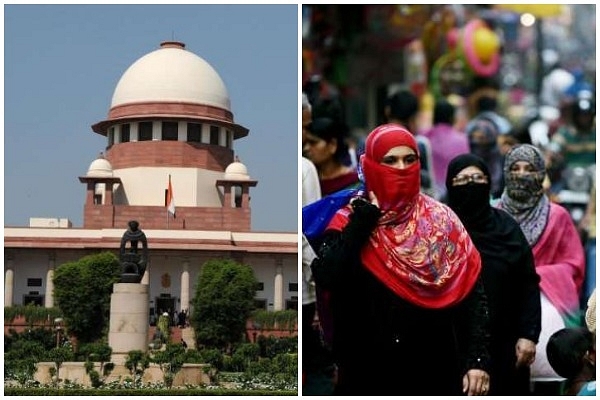Insta
‘Do We Really Need To Decide If Female Genital Mutilation Is A Crime?’ Critics Question Supreme Court’s Move

A view of the Supreme Court and Muslim women walk across a busy street in New Delhi.
A Supreme Court bench consisting of Chief Justice of India Dipak Misra, Justice A.M. Khanwilkar and Justice D.Y. Chandrachud has referred to a five-judge Constitution bench, a Public Interest Litigation (PIL) challenging the practice of female genital mutilation by the Dawoodi Bohra Muslim community.
The PIL challenged the practice on the ground that the act of mutilation, which is committed when the girl child is over five years old and before puberty, was in contravention of the United Nations Convention on the Rights of the Child and United Nations Universal Declaration of Human Rights. India is a signatory to both the aforementioned conventions. Also, the plea added that the practice of mutilating a girl child’s genitals caused permanent disfiguration to her body.
The reference to a five-judge bench comes after a group of Dawoodi Bohra Muslims said that the practice was common among certain Islamic sects and that the validity of such a practice should be determined by a constitution bench of the apex court.
Critics of this referral to a larger bench took to Twitter asking how there’s a doubt regarding whether female genital mutilation is a crime.
It may be noted that the practice of female genital mutilation is banned by a number of African and European countries and is also proscribed by the United States of America.
Introducing ElectionsHQ + 50 Ground Reports Project
The 2024 elections might seem easy to guess, but there are some important questions that shouldn't be missed.
Do freebies still sway voters? Do people prioritise infrastructure when voting? How will Punjab vote?
The answers to these questions provide great insights into where we, as a country, are headed in the years to come.
Swarajya is starting a project with an aim to do 50 solid ground stories and a smart commentary service on WhatsApp, a one-of-a-kind. We'd love your support during this election season.
Click below to contribute.
Latest